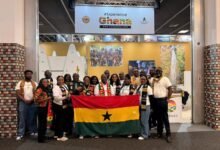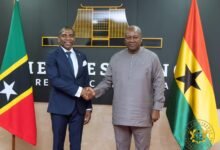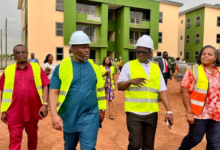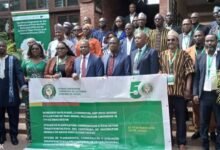
The International Federation of Red Cross and Red Crescent Societies (IFRC) has allocated $1 million to support locally-led climate change actions in Ghana over a period of five years.
The project, which spans from 2022-2027, is to be undertaken in collaboration with the Ghana Red Cross Society ( GRCS) with funding from the United States Agency for International Development (USAID).
It aimed at promoting communities to reduce their climate-related risks and adapt to climate change, including in some of the least supported and most vulnerable and marginalised communities.
At a stakeholder briefing on the IFRC’s local-led adaptation and humanitarian response to climate change in Accra on Thursday, the Regional Coordinator of Climate Change at IFRC, Patrick Twala, said the project would focus on scaling up locally-led integrated and multi-sectoral approaches which could help build sustained climate resilience at the community level.
He said it would introduce a new, holistic and more strategic approach to ensure transformative changes across targeted national societies, institutional set-up, programmes and operations, ensuring that they become truly ‘climate-smart’ and scale-up evidence-based locally-led climate change adaptation efforts.
Mr Twala said the project was targeted to reach 250 million people and about 100 million communities by 2025 to ensure that they build their capacity and resilience while enhancing their knowledge to understand and appreciate the locally-led climate change adaptation.
“We’re going to work with the government of Ghana through the Ghana Red Cross Society to map out on the key priority areas to be implemented to ensure that we bring complementarity rather than a duplication of all other competition,” he added.
He said the project would offer a holistic chain of activities to support the development of an approach to influencing national and local policies, plans and legal frameworks.
“We want communities to be leaders of their own action. We want them to prioritise their action plans and climate risk actions to be undertaken and we want to appreciate their local governance and traditional knowledge mechanism on how they adapt to climate change. We want all these actions to inform global decision from the village perspective,” Mr Twala stated.
The Head of Country Delegation for Nigeria, Benin, Togo and Ghana, Bhupinder Tomer, said climate and the environment had huge impact on human beings and emphasised the need to adopt a bottom-up approach in mitigating its effect.
He said it was critical to note that Africa was at the highest risk of climate change than ever before and the need to speed up progammes that ensure localised adaptations and resilience.
He made reference to the heat waves, flooding and drought which had caused devastations in various parts of the African Continent.
“A few weeks ago, South Sudan closed schools because of heat waves, we have experienced a lot of flooding around Malawi, prolong droughts in the northern horn of Africa and the flooding in Kenya where about 300 lives were lost. So in terms of the climate risk, Africa is bearing the greatest brunt,” he stressed.
The President of GRCS, Kwame Gyimah Akwafo, said the collaboration with IFRC would help reduce current and future humanitarian impacts of climate change in Ghana and support people homegrown adaptation mechanisms, increase understanding of the climate crisis and mobile positive action.
The IFRC is a secretariat of 191 National Red Cross and Red Crescent Societies as the secretariat to all National Societies, including the Ghana Red Cross Society.
They provide coordination and capacity building to all its members to enable them to deliver on their mandate as auxiliary to their public authorities in providing humanitarian assistance to vulnerable communities in emergencies and peace time.
The locally-led adaptation project is being implemented in five African countries, namely, Malawi, Kenya, Nigeria (on-going), Ghana, Burkina Faso, and Gambia.
BY VIVIAN ARTHUR







